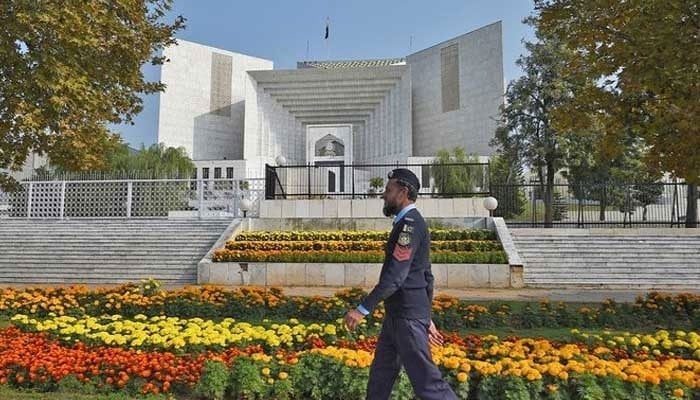Judges transferred to IHC in haste, SC told
Justice Afghan noted that in India, high court judges were part of unified cadre, which was not case in Pakistan
ISLAMABAD: The Supreme Court was told on Tuesday that unusual haste was shown in the transfer of judges to the Islamabad High Court (IHC) without considering various aspects related to the case.
A five-member constitutional bench — headed by Justice Muhammad Ali Mazhar — heard the identical petitions filed by six judges of the Islamabad High Court against the transfer of judges to the IHC. The other members of the bench included Justice Naeem Akhtar Afghan, Justice Shahid Bilal Hassan, Justice Salahuddin Panhwar, and Justice Shakeel Ahmed.
Hamid Khan claimed that unusual haste was shown in the transfer of judges. Justice Muhammad Ali Mazhar, however, remarked that in India, judges’ consent was not sought for transfers; instead, transfers occur in consultation with the chief justice; however, in Pakistan, consent for a judge’s transfer was a constitutional requirement.
Justice Naeem Akhtar Afghan noted that in India, high court judges were part of a unified cadre, which was not the case in Pakistan. Justice Shakeel Ahmed added that in India, the seniority list for high court judges was unified.
Hamid Khan questioned as to what public interest could be served by the transfer of a judge. He contended that the chief justice was consulted after sending the summary. In India, Hamid Khan submitted consultation with the chief justice was mandatory before a transfer. He emphasized that consent was necessary for judges’ transfers, and under Section 3 of the Islamabad High Court rules, consultation before transfers or new appointments was essential.
Hamid Khan further argued that there were other reasons behind the transfer and that the chief justice of Pakistan should have consulted with the chief justices of high courts regarding the judges’ transfers. He insisted that the selection of judges for transfer should be based on merit, and this authority should not be given to the executive; rather, the chief justice should have the power to select names. He suggested that instead of transfers, new appointments should have been made in the Islamabad High Court. He contended that the consultation process in the transfer of Justice Khadim Hussain was flawed adding that for the transfer of a judge from Balochistan, consultation was made with the acting chief justice.
Hamid Khan pointed out that the advice for judges’ transfers was also flawed and not approved by the cabinet. The counsel claimed that the main aim was to bring Justice Sarfaraz Dogar to the Islamabad High Court, while the transfer of other two judges was merely for show. He contended that Article 200 of the Constitution was exercised for misuse of powers.
Meanwhile, after Hamid Khan concluded his arguments, Idress Ashraf, counsel for PTI founder, submitted that the notification did not mention the duration of the judges’ transfers. He argued that transferring judges could not create discrimination among judges already serving in the high court and that all judges must be treated equally.
Justice Muhammad Ali Mazhar remarked that it seemed the argument was that Article 25 (equality before law) should apply to the transfer process. He questioned whether the petitioner would be satisfied if the transfer duration had been specified as two years and emphasized that the real issue was seniority. Later, the court adjourned the hearing for today (Wednesday) at 9:30am.
-
 Annular Solar Eclipse 2026: Where And How To Watch ‘ring Of Fire’
Annular Solar Eclipse 2026: Where And How To Watch ‘ring Of Fire’ -
 Zayn Malik Explains Past Comments About Not Being In Love With Gigi Hadid
Zayn Malik Explains Past Comments About Not Being In Love With Gigi Hadid -
 Internet Reacts To 10 Days Flight Ban Over El Paso
Internet Reacts To 10 Days Flight Ban Over El Paso -
 YouTube Music Tests AI-powered ‘Your Week’ Recap To Summarise Listening Habits
YouTube Music Tests AI-powered ‘Your Week’ Recap To Summarise Listening Habits -
 Kelly Clarkson Ready To Date After Talk Show Exit?
Kelly Clarkson Ready To Date After Talk Show Exit? -
 Is AI Heading Into Dangerous Territory? Experts Warn Of Alarming New Trends
Is AI Heading Into Dangerous Territory? Experts Warn Of Alarming New Trends -
 Google Updates Search Tools To Simplify Removal Of Non-consensual Explicit Images
Google Updates Search Tools To Simplify Removal Of Non-consensual Explicit Images -
 Chilling Details Emerge On Jeffrey Epstein’s Parties: Satanic Rights Were Held & People Died In Rough Intimacy
Chilling Details Emerge On Jeffrey Epstein’s Parties: Satanic Rights Were Held & People Died In Rough Intimacy -
 50 Cent Gets Standing Ovation From Eminem In New 'award Video'
50 Cent Gets Standing Ovation From Eminem In New 'award Video' -
 Bad Bunny Delivers Sharp Message To Authorities In Super Bowl Halftime Show
Bad Bunny Delivers Sharp Message To Authorities In Super Bowl Halftime Show -
 Prince William 'worst Nightmare' Becomes Reality
Prince William 'worst Nightmare' Becomes Reality -
 Thai School Shooting: Gunman Opened Fire At School In Southern Thailand Holding Teachers, Students Hostage
Thai School Shooting: Gunman Opened Fire At School In Southern Thailand Holding Teachers, Students Hostage -
 Maxwell Could Get 'shot In The Back Of The Head' If Released: US Congressman
Maxwell Could Get 'shot In The Back Of The Head' If Released: US Congressman -
 Britain's Chief Prosecutor Breaks Silence After King Charles Vows To Answer All Andrew Questions
Britain's Chief Prosecutor Breaks Silence After King Charles Vows To Answer All Andrew Questions -
 New EU Strategy Aims To Curb Threat Of Malicious Drones
New EU Strategy Aims To Curb Threat Of Malicious Drones -
 Halle Berry On How 3 Previous Marriages Shaped Van Hunt Romance
Halle Berry On How 3 Previous Marriages Shaped Van Hunt Romance




